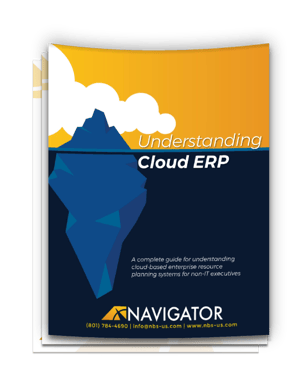
Why Doesn’t Your Small Business Have ERP?
Some companies have easy invoicing, proactive planning, smooth HR practices and fluid operations that handle changes in the business landscape well. Others don’t.
The difference often is technology investment and taking the steps that lay the foundation for solid backend processes. Having a modern enterprise resource planning (ERP) solution in place is central to laying this foundation.
So why does your business not have an ERP system in place? Probably because it looks like an expensive, involved project and your existing systems seem “good enough.” Maybe the uncertainty in the economy also is a factor.
The reality is that this inertia is not warranted, however. The cost and complexity of an ERP implementation has decreased dramatically with the introduction of cloud-based ERP solutions. Turnkey industry solutions can reduce the time and complexity even further. Having an ERP system in place also helps a business weather market uncertainty and make sense of how an organization should adjust.
If your business doesn’t currently use ERP for financial and operational management, here are five reasons why now is the time to upgrade and lay that solid foundation.
1. Price and Complexity Have Gone Down
In the past, ERP systems were meant primarily for larger businesses. They required massive infrastructure investment, customization and planning. They also were complex to use.
Cloud ERP changed all that, making ERP accessible for SMBs even with a few dozen employees. It now is possible to adopt an ERP system that comes pre configured and with industry best practices already in place.
Read our case study on how Countrywide Tire put a new ERP system in place in less than 6 months and both cut $11,000 in IT expenses per year and gained 20 percent in additional revenue as a result.
- Helps Businesses Go Digital
It is old news that every business is now a digital business. Sales happen online and through digital marketplaces, supplier orders can be refilled automatically when stock is low, employees need access to company from anywhere with any device, data is plentiful and making sense of it in real-time is central to competitiveness today.
Not every business is fully digital, however, and ERP makes digital transformation possible by bringing all business data and processes into a single, integrated cloud-based system that connects to other systems, automates extensively, and processes data for real-time insight. The way to a fully digital business that is automated, digital and connected flows through ERP adoption.
3. Reduces IT Headaches
Technology is moving fast, which means IT systems are constantly evolving. The two ways that businesses keep up with this change is constant software upgrades or a hodgepodge of cloud solutions that handle the upgrades for the business.
Cloud ERP meets the challenge of constant IT change by being a cloud service, but it lessens the burden by serving as an integrated, all-in-one solution so ongoing changes among cloud services don’t break business processes or require constant adjustments. Cloud ERP keeps things current—and working together seamlessly.
This cuts down on IT headaches even for small businesses.
- Configuration, Not Customization
Every business is different, which is why customization once was a big part of why ERP implementations cost so much and took so much time; each business needed to customize the solution through custom code to fit existing business processes.
Modern ERP solutions have largely solved that problem, and now almost everything a business needs can take place though configuration of settings instead of developing and managing customized solutions.
“We see it all the time,” says Grant Fraser, CEO of Navigator Business Solutions and a veteran of the ERP industry. “People insist on customization during the implementation. Then once they go live, they realize they didn’t need the customization—there is already a way to do what they wanted built into the system by default.”
Setting up an ERP system for your business is easier than you think.
5. One System to Learn Instead of Many
There’s a silent cost from cobbling together a number of different software solutions: learning and remembering how each of these solutions work. This gets worse with the cloud, too, because cloud solutions are evolving all the time and therefore require constantly adjusting to the “new way” that menus and features perform.
By adopting an ERP system, a business standardizes around a single, easy to use interface that applies to all major software processes across the company. There’s only one system to learn, and its interface is consistent across business functions. This makes ERP much easier to use than relying on many specialized solutions, each with their own ways of organizing things.
With less systems to learn, a small business can focus less on the tools and more on what really matters: getting things done.
Working from an ERP system represents a dividing line between best-run companies and those trying to keep up. Isn’t it time that your business leveled up?
To learn more about ERP and what it can offer your business, download our free guide on Understanding Cloud ERP for Non-IT Executives.


